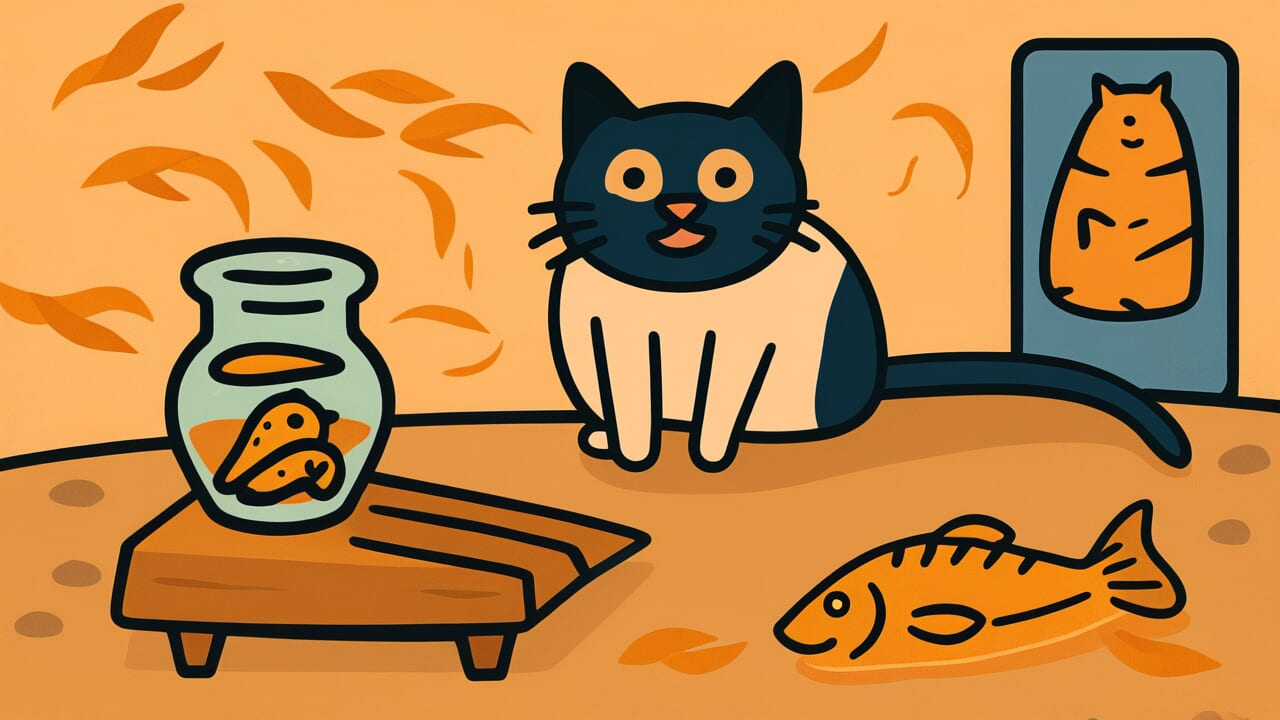How to Read “When the cat gets fat, the dried bonito gets thin”
Neko ga koereba katsuobushi ga yaseru
Meaning of “When the cat gets fat, the dried bonito gets thin”
This proverb shows that when one side gains a benefit, the other side must suffer a loss. In other words, gain and loss are two sides of the same coin. Someone’s happiness is built on someone else’s misfortune.
This saying is used in situations involving limited resources or benefits. Examples include budget allocation, time management, or conflicts of interest in relationships.
If one department gets more budget, another department’s budget decreases. If you spend time with one person, you have less time for someone else.
People use this expression to clearly explain the nature of competing interests. The concrete image of a cat getting fat while the dried bonito shrinks helps people intuitively understand abstract economic principles.
Even today, it’s an effective way to explain zero-sum situations and trade-off relationships.
Origin and Etymology
No clear written records explain the origin of this proverb. However, it likely emerged from the everyday experiences of common people during the Edo period.
In those days, cats were valued as helpful animals that caught mice. Meanwhile, dried bonito was a precious preserved food and seasoning for ordinary people.
Cats love dried bonito. The more you feed your house cat this treat, the fatter the cat becomes. But naturally, your household’s supply of dried bonito decreases by the same amount.
From this everyday scene, people created a proverb expressing economic cause and effect. When one side gains, the other side must lose.
Common people in the Edo period lived with limited resources. They felt the reality of resource allocation in their bones. If you gave more to one thing, something else had to decrease.
By using the familiar combination of cats and dried bonito, this proverb makes complex economic principles easy for anyone to understand.
Though simple, it brilliantly captures the relationship between gain and loss. That’s why people have passed it down through generations.
Usage Examples
- We moved budget to the new project and existing operations got cut. It’s exactly “when the cat gets fat, the dried bonito gets thin.”
- I reduced overtime to spend more time with family, but my income dropped. I guess it’s “when the cat gets fat, the dried bonito gets thin.”
Universal Wisdom
This proverb has been passed down because it touches on a fundamental truth about human society. That truth is the undeniable fact that resources in this world are limited.
We all want to be happy. But in reality, it’s difficult for everyone to be satisfied at the same time.
Time, money, affection, attention—everything is finite. When you choose something, you must give up something else. When you give something to someone, you can’t give it to someone else.
This truth may sometimes feel cruel. But our ancestors knew the importance of facing this reality head-on rather than looking away.
The question of how to allocate limited resources is exactly where human wisdom and ethics are tested.
Should you fatten the cat or preserve the dried bonito? There’s no right answer to that choice.
What matters is understanding what you gain and what you lose through your choices. And taking responsibility for those choices.
This proverb quietly reminds us about the weight of life’s choices. It tells us never to forget the sacrifices behind them.
When AI Hears This
When you look at a cat eating dried bonito and getting fat through physics, a surprising fact emerges. A cat’s body is a highly ordered system maintained at about 37 degrees Celsius.
Maintaining this order actually requires enormous energy exchanges.
Dried bonito molecules are collections of proteins and lipids with carbon, hydrogen, and oxygen arranged in regular patterns. When a cat eats this, digestion breaks molecular bonds.
Eventually they’re released as carbon dioxide, water, and heat. Orderly molecules scatter as gas molecules into the atmosphere.
Physics calls this scattering “entropy.” The dried bonito’s entropy increases dramatically when eaten.
What’s interesting is that a cat needs about 5 grams of dried bonito to gain 1 gram of body weight. Where did the other 4 grams go?
Most dissipates into the environment as heat and waste, increasing the disorder of the entire universe.
Life is an existence that continuously creates greater disorder around itself to maintain a small island of order called “self.”
This proverb brilliantly captures this unavoidable one-sidedness of the universe in the everyday space of a kitchen.
Lessons for Today
What this proverb teaches modern people is the reality that choices always come with a cost. Spend time on work and you lose family time.
Spend money on hobbies and your savings decrease. Spend time with one friend and you grow distant from another. This is an unavoidable fact.
However, this teaching isn’t pessimistic at all. Rather, it explains the importance of making conscious choices.
When you understand what you’re giving up to gain something, you can make decisions without regret.
Modern society spreads the illusion that you can have everything. But in reality, your time and energy are limited.
That’s exactly why you need the courage to focus on what truly matters.
Should you fatten the cat or preserve the dried bonito? That choice is yours to make.
What matters is being aware of what you choose and what you give up. And taking pride in that choice.
Precisely because life is limited, each choice has its own brilliance.



Comments